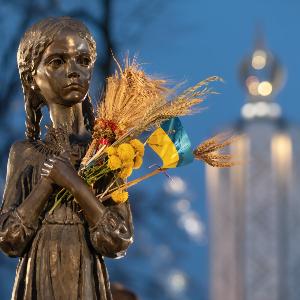Researching violence, strengthening ties
25 Oct 2023
The BMBF is funding a German-Ukrainian center for historical research at LMU and the Ukrainian Catholic University.
25 Oct 2023
The BMBF is funding a German-Ukrainian center for historical research at LMU and the Ukrainian Catholic University.

Memorial in Kiev commemorating the victims of the Holodomor | © IMAGO/Pond5 Images
A joint project between German and Ukrainian scholars has been founded to research the history of mass violence in the 20th century. To this end, a research center will be established at the Ukrainian Catholic University in Lviv in cooperation with LMU Munich, with funding from the German Federal Ministry of Education and Research (BMBF). The BMBF approved a total of four such centers on Monday, with the goal of promoting academic cooperation between Germany and Ukraine.
Professor Martin Schulze Wessel, Chair of Eastern and South Eastern European History at LMU, and Professor Yaroslav Hrytsak, historian at the Ukrainian Catholic University in Lviv, are involved in the new center for historical research. “For German-Ukrainian relations in the field of history, this is a very welcome decision,” says Martin Schulze Wessel. “But also for the general public, this joint scholarly inquiry into the history of the 20th century is of great interest.”
The center will research the history of violence in the first half of the 20th century and connect it with the history of its memory in the second half of the century. There will be three main prongs to this work: First, the researchers will study mass crimes committed in the Soviet Union in the 1930s, in particular the Holodomor, the Great Ukrainian Famine caused by the Soviet regime, which had almost four million victims. Another topic is mass violence committed by the Germans, the crimes of the German occupying forces, and in particular the Holocaust. Finally, the center will study the topics of propaganda and memory – looking into the German occupation and the Soviet crimes in Ukraine during the Cold War.
The new research center is a pioneering project in the relations between historical scholarship in the two countries, says Martin Schulze Wessel. Aside from the German-Ukrainian Historical Commission, which Schulze Wessel and Yaroslav Hrytsak founded in 2015 after Russia’s illegal annexation of Crimea and the start of the Russo-Ukrainian War, there has been “no institutional research connections between German and Ukrainian universities or institutes in the field of history” before now.
The BMBF is funding a total of four German-Ukrainian research centers in various disciplines. In addition to history, these are quantum physics, plasma technology, and natural products research. For each center of excellence, the ministry will provide around 2.5 million euros of funding for four years starting from 2024. “The Russian war of aggression on Ukraine is also impacting Ukrainian research with ongoing severity,” says German Minister of Education and Research Bettina Stark-Watzinger. “With the four German-Ukrainian centers of excellence which have now been selected, we’re deliberately helping Ukraine maintain a modern academic system with strong research capabilities and a functioning transfer of knowledge to industry and society.” This is also an important contribution to the rebuilding of the country, she added.